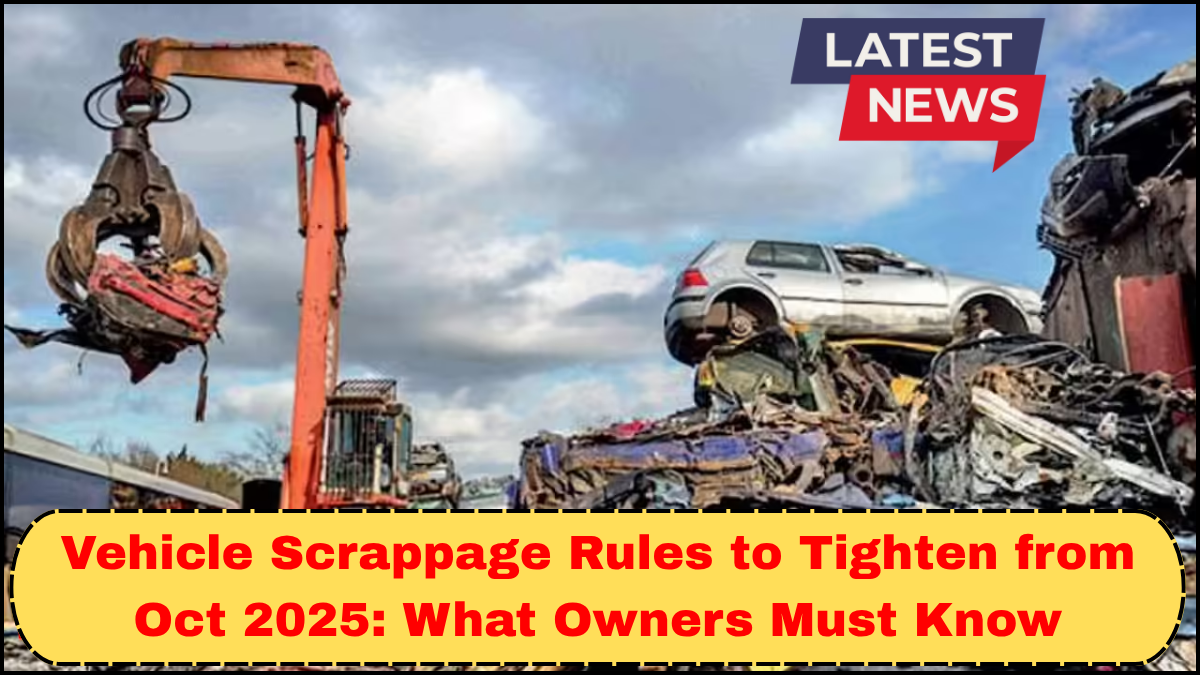The Indian government is sharpening its focus on phasing out old and polluting vehicles as part of its broader push toward cleaner mobility. Starting October 2025, stricter vehicle scrappage and deregistration rules will come into effect under the revised India scrappage policy 2025. If you own an older vehicle—especially those nearing the end of their registration lifecycle—these changes could directly affect your rights to operate or retain them.

Here’s what you need to know to stay compliant and make informed decisions.
What Is the India Scrappage Policy 2025?
The India scrappage policy 2025 is a government initiative aimed at promoting the systematic removal of outdated and polluting vehicles from the roads. The core goal is to reduce vehicular emissions, improve road safety, and boost the adoption of modern, fuel-efficient vehicles.
This policy categorically targets:
-
Private vehicles older than 20 years
-
Commercial vehicles older than 15 years
-
Government vehicles older than 15 years
Under the upcoming framework starting October 2025, these vehicles could face automatic deregistration unless they pass stringent fitness and emissions tests.
Key Changes Coming in October 2025
The tightening of rules in October 2025 means that vehicle deregistration will no longer be a delayed or optional administrative step. It will become a mandatory, system-driven action unless owners take proactive steps. Here’s a breakdown of what’s changing:
1. Automatic Deregistration for Unfit Vehicles
All vehicles failing fitness tests will face automatic deregistration. This especially affects older vehicles that don’t comply with current emissions norms (BS6 or above). Even a single failed test can trigger deregistration unless the vehicle is scrapped or refurbished to meet standards.
2. Mandatory Scrapping for Government Fleet
From October 2025, all government-owned vehicles older than 15 years will be mandatorily scrapped, regardless of condition. This includes vehicles owned by central and state governments, PSUs, and autonomous bodies.
3. Incentivized Voluntary Scrapping
The policy includes voluntary scrappage incentives such as:
-
Waiver on registration fees for new vehicles
-
Scrappage certificates that can be used to get discounts on new purchases
-
Possible road tax concessions (subject to state policy)
4. No Renewal of Registration for Non-Compliant Vehicles
Vehicles that don’t clear the fitness or emission tests will not be eligible for renewal of registration. Owners will have no legal basis to continue using them, effectively rendering such vehicles unusable on public roads.
Vehicle Fitness Testing Will Be the New Norm
Under the revised scrappage regime, fitness testing will become the central criterion for vehicle eligibility. This testing must be conducted at government-authorized Automated Fitness Testing Centers (AFTCs).
Key parameters in these tests include:
-
Emissions compliance
-
Brake and suspension health
-
Structural integrity
-
Safety equipment standards
These checks will be digital and tamper-proof, reducing corruption and subjectivity.
How Vehicle Owners Should Prepare
To avoid sudden surprises, vehicle owners—especially those with cars older than a decade—should start planning now:
-
Check your vehicle’s age and registration expiry date.
-
Get a voluntary fitness test done before 2025 to assess where your vehicle stands.
-
Keep your service history up to date, especially for emissions-related repairs.
-
Explore scrappage benefits, especially if you’re considering buying a new vehicle in the next 1–2 years.
If your vehicle is approaching the 15- or 20-year mark, you’ll need to decide whether to upgrade, refurbish, or scrap.
Impact on Commercial and Private Vehicle Owners
For commercial vehicles, the operational cost of maintaining older fleets will likely increase, as more frequent testing and mandatory fitness certifications add logistical and financial burden. Transport companies may need to accelerate fleet modernization to stay compliant.
For private vehicle owners, especially in urban areas where local pollution control norms are more aggressive, there could be city-specific bans on older vehicles even before national deadlines kick in.
Environmental and Economic Implications
While the tightening of the India scrappage policy 2025 aims to cut pollution and improve safety, it also boosts the automobile industry by stimulating demand for new vehicles. It promotes circular economy practices through authorized scrappage centers, which can recover valuable materials like steel, copper, and plastic for reuse.
FAQs
Q1: Will I be compensated for scrapping my old vehicle?
Yes, you will receive a scrappage certificate, which can be used to get discounts (5%–15%) on new vehicle purchases and possible road tax waivers.
Q2: What happens if I don’t scrap my old vehicle after deregistration?
You will not be allowed to legally use it on public roads. Using a deregistered vehicle can result in fines, impounding, or both.
Q3: Can vintage or classic vehicles be exempted?
Yes, registered vintage vehicles and those classified under classic or heritage status may be exempt, subject to state guidelines and certification.
Q4: Are two-wheelers included in this policy?
Currently, the focus is on four-wheelers and commercial vehicles. However, similar frameworks for two-wheelers may be considered in the future.
Q5: How do I find an authorized scrappage center?
You can visit the Ministry of Road Transport and Highways (MoRTH) website for an updated list of Registered Vehicle Scrapping Facilities (RVSFs).
click here to learn more
